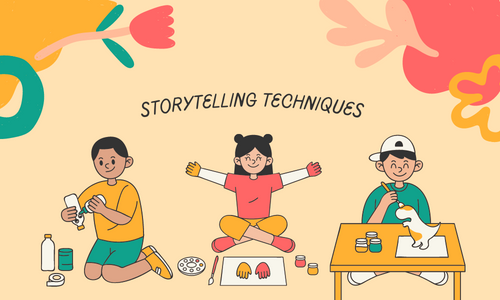Table of Contents
Introduction
Parenting can be a challenging journey filled with ups and downs. As parents, we strive to provide the best for our children, guiding them through life’s obstacles and teaching them valuable lessons. One powerful tool that can significantly impact our parenting approach is storytelling. This article will explore the art of storytelling and how it can empower parents to connect with their children, impart wisdom, and foster emotional growth.
The Power of Stories in Parenting
Storytelling has been an integral part of human culture for centuries. From ancient tales passed down through generations to modern-day narratives, stories captivate our imagination, evoke emotions, and teach us valuable lessons. When it comes to parenting, storytelling becomes a potent tool for connection and growth.
Creating a Bond through Shared Narratives
Sharing stories with your children creates a unique bond between parent and child. As you embark on imaginary adventures, you establish a sense of togetherness and strengthen your relationship. Children feel secure and loved when their parents take the time to share stories and engage in their world.
Building Emotional Intelligence through Storytelling
Stories can evoke various emotions, allowing children to explore and understand their feelings in a safe and controlled environment. By exposing children to different emotional experiences through storytelling, parents can help them develop emotional intelligence, empathy, and self-awareness.`
Teaching Values and Life Lessons
Parents can impart essential values and life lessons through stories to their children. Moral dilemmas and character development in stories provide opportunities for parents to discuss and reflect on crucial topics such as honesty, kindness, resilience, and respect. Children internalize these lessons through the narratives they encounter.
Enhancing Creativity and Imagination
Engaging in storytelling sparks creativity and imagination in children. When parents weave tales that transport their children to imaginary worlds, they encourage the development of creative thinking, problem-solving skills, and the ability to think outside the box. These skills are valuable for navigating real-life challenges.
Cultivating Problem-Solving Skills
Stories often present characters faced with obstacles and conflicts, providing a platform for problem-solving discussions with children. Parents can encourage their children to brainstorm solutions, analyze consequences, and think critically. These experiences foster the development of practical problem-solving skills, teaching children how to overcome challenges.
Boosting Confidence and Self-Esteem
By involving children in storytelling, parents can boost their confidence and self-esteem. Encouraging children to participate in narrative-building, such as suggesting plot twists or creating their characters, empowers them to express their ideas and opinions. This involvement instills a sense of ownership and confidence in their abilities.
Nurturing Empathy and Understanding
Stories have a unique way of helping children understand different perspectives and experiences. By introducing diverse characters and storylines, parents promote empathy and understanding. Children learn to relate to others, appreciate differences, and develop a sense of compassion for those around them.
Stimulating Language Development
Engaging children in storytelling exposes them to rich vocabulary, sentence structures, and language patterns. As parents narrate stories, children absorb language nuances, expanding their vocabulary and improving their language skills. This exposure to language enhances communication abilities and lays a strong foundation for literacy.
Fostering Cultural Appreciation
Storytelling allows parents to share their cultural heritage and traditions with their children. By exploring stories from different cultures and backgrounds, parents can cultivate an appreciation for diversity, instilling a sense of cultural pride and respect for others.
Tailoring Stories to Different Ages and Interests
Compelling storytelling involves tailoring stories to suit the age and interests of your children. Younger children may enjoy simple and imaginative tales, while older children prefer more complex narratives. Adapting stories to their developmental stage ensures engagement and maximizes the impact of the storytelling experience.
Incorporating Technology in Storytelling
In today’s digital age, technology can be a valuable tool for storytelling. Parents can leverage interactive storytelling apps, audiobooks, and e-books to enhance the storytelling experience. However, balancing technology and traditional storytelling methods is essential to maintain meaningful connections with children.
Finding Inspiration: Books, Folklore, and Personal Experiences
Inspiration for storytelling can be found in various sources. Both classic and contemporary books provide a treasure trove of stories to explore. Folklore and mythology from different cultures offer a glimpse into rich traditions. Additionally, parents can draw from personal experiences, creating stories that reflect their own lives and values.
Practical Tips for Effective Storytelling
Use expressive and engaging voice tones to captivate your child’s attention.
Incorporate gestures and facial expressions to enhance the storytelling experience.
Maintain eye contact with your child to establish a strong connection.
Encourage participation by asking questions and inviting your child to share their thoughts.
Make storytelling interactive by using props, puppets, or visual aids.
Adapt your storytelling style based on your child’s response and engagement.
Create a cozy and comfortable environment to make storytelling sessions memorable.
Conclusion
Storytelling is a powerful tool that empowers parents to connect with their children, foster emotional growth, and impart valuable life lessons. Through shared narratives, parents create bonds, nurture creativity, and stimulate emotional intelligence. By incorporating storytelling into their parenting journey, parents can empower themselves and create lasting memories with their children.
Frequently Asked Questions
Can storytelling help improve my child’s language skills?
Absolutely! Engaging children in storytelling exposes them to rich vocabulary and language patterns, stimulating language development and enhancing their communication abilities.
How can I find appropriate stories for my child’s age?
Look for age-appropriate books, explore folklore and mythology, and consider personal experiences that can be transformed into relatable stories for your child.
Is it essential to include moral lessons in storytelling?
Including moral lessons in storytelling allows children to learn and internalize crucial values and principles. However, it’s necessary to strike a balance and not make the stories overly didactic.
Can technology be incorporated into storytelling?
Technology can complement storytelling experiences through interactive apps, audiobooks, and e-books. However, it’s crucial to maintain a balance between technology and traditional storytelling methods.
How can I make storytelling interactive for my child?
To make storytelling interactive, you can ask questions throughout the story, encourage your child to predict what might happen next, or even invite them to participate by suggesting their ideas for the plot or characters.
Can storytelling help develop my child’s problem-solving skills?
Yes, storytelling provides a platform for discussing problem-solving strategies. You can engage your child in conversations about how the characters in the story could overcome challenges, encouraging them to think critically and develop their problem-solving abilities.
Are there any benefits to telling stories from my own experiences?
Sharing stories from your life creates a personal connection with your child and allows them to learn from your experiences. It can impart valuable life lessons and provide a sense of family history and identity.
How often should I incorporate storytelling into my parenting routine?
The frequency of storytelling can vary depending on your child’s age and interests. It can be a daily ritual before bedtime or a particular weekend activity. Find a schedule that works for you and your child, ensuring that storytelling remains enjoyable and engaging.
Can storytelling be beneficial for older children as well?
Absolutely! Storytelling is not limited to young children. Older children can benefit from engaging narratives, complex plots, and discussions surrounding the themes and lessons conveyed in the stories.
How can storytelling strengthen the parent-child bond?
Storytelling provides quality time spent together, fostering a strong bond between parent and child. Creating a safe and nurturing storytelling environment builds trust, enhances communication, and creates lasting memories.
Summary
Remember, storytelling is a powerful tool that allows parents to empower themselves and positively impact their children’s lives. By incorporating storytelling into your parenting approach, you can create an enriching and meaningful experience that will benefit you and your child for years.





Pingback: Benefits of storytelling
Pingback: Storytelling techniques
Pingback: Bedtime stories